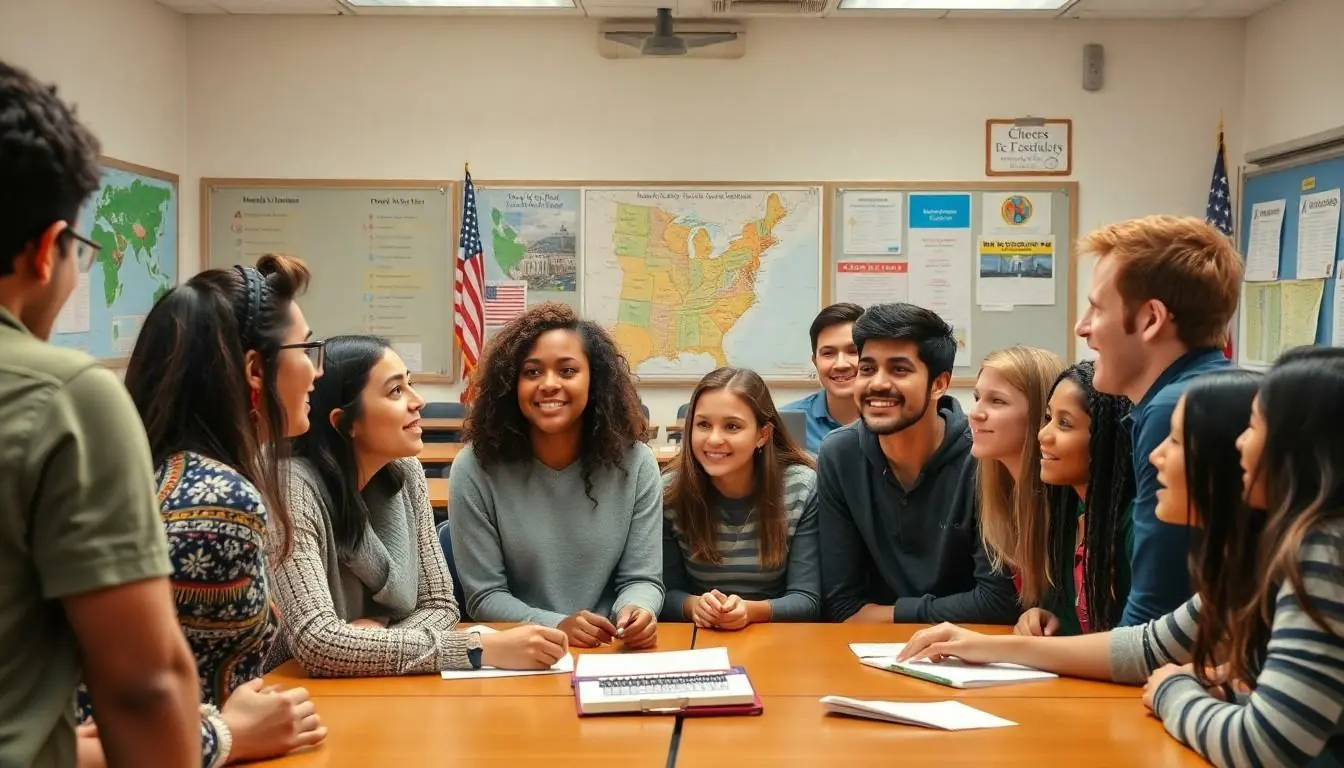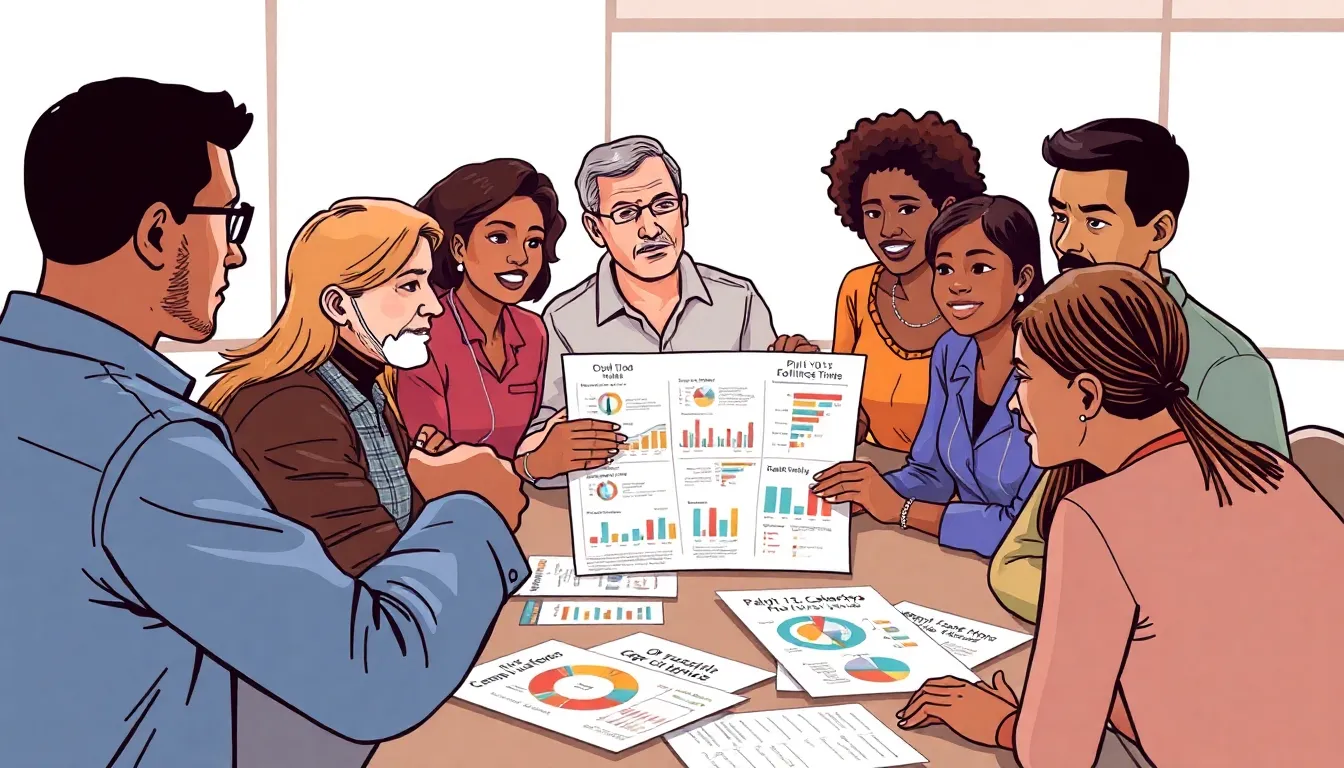Political socialization shapes how individuals perceive their roles in society and influences their beliefs and values. But what really steers this fascinating journey? Is it family, schools, or maybe that one uncle who insists on discussing politics at every family gathering? While all these factors play a role, one agent tends to rise above the rest, wielding more influence than a celebrity on social media.
Table of Contents
ToggleOverview of Political Socialization
Political socialization shapes individuals’ views and behaviors within society. It encompasses various influences that guide citizens in forming beliefs and values.
Definition of Political Socialization
Political socialization refers to the lifelong process through which individuals develop their political beliefs and values. Factors such as family, education, and social interactions play critical roles in this journey. Families often serve as the primary influence, instilling foundational ideas about governance and participation. Educational institutions further reinforce these beliefs, introducing concepts of civic responsibility and democratic participation. Social interactions also contribute to an individual’s understanding of political dynamics, allowing for diverse perspectives and debates.
Importance of Political Socialization
Political socialization is vital for fostering informed and engaged citizens. Understanding the political landscape helps individuals navigate complex societal issues. It also cultivates civic participation, encouraging people to vote, advocate, or participate in community efforts. Strong political socialization ultimately influences the stability and progression of societies by ensuring active engagement. By equipping individuals with knowledge about rights and responsibilities, it promotes a healthier democracy where every voice matters.
Agents of Political Socialization
Political socialization involves various agents that shape individuals’ political beliefs and values. Family, educational institutions, peer groups, media, and religious institutions all play significant roles in this ongoing process.
Family as an Agent
Family serves as the foundational agent of political socialization. Early exposure to political discussions at home shapes children’s political perspectives. Parents often instill values, party preferences, and civic responsibilities during formative years. Children align their beliefs with those of their family as they grow. Research indicates that familial influences often carry the most weight compared to other agents.
Educational Institutions
Schools play a crucial role in political socialization by providing students with civic education. Through formal lessons, students learn about government structures, rights, and responsibilities. Discussion in classrooms helps students understand diverse viewpoints. Participation in school activities fosters civic engagement and encourages critical thinking about societal issues. Educational institutions also introduce students to normative values essential for informed citizenship.
Peer Groups
Peer groups significantly influence political socialization, particularly during adolescence. Friends share ideas and beliefs, shaping individual opinions through discussions and interactions. Social settings allow individuals to engage with diverse perspectives outside their families. Often, peers encourage political involvement and activism. This environment fosters a sense of belonging and shared identity regarding political ideologies.
Media Influence
Media serves as a powerful agent of political socialization, influencing public opinion and awareness. News outlets, social media platforms, and entertainment shape perceptions of political issues and figures. Through regular exposure to various narratives, individuals form opinions on current events. Increased reliance on digital media for information significantly affects political engagement, particularly among younger populations. Media’s role in shaping political discourse continues to evolve with technological advancements.
Religious Institutions
Religious institutions contribute to political socialization by providing a moral framework. Churches, synagogues, and mosques often address social justice and community service issues. Individuals align political beliefs with their religious values, influencing their stance on various societal issues. Participation in religious communities fosters discussions around ethical dilemmas and encourages civic responsibility. Religious institutions can mobilize individuals toward political participation and advocacy.
Analyzing the Most Important Agent
Political socialization significantly shapes perceptions and political beliefs. Various agents influence this process, but some stand out more than others.
Criteria for Importance
Several criteria determine the importance of an agent in political socialization. First, the emotional connection individuals have with the agent plays a crucial role. Family often establishes foundational beliefs and values, making its influence profound. Next, accessibility to the agent affects how consistently individuals engage with political ideas. Individuals frequently encounter educational institutions, which promote civic understanding. Additionally, the ability of the agent to encourage critical thinking about political issues ranks highly. When individuals critically engage with information, their beliefs become more stable and nuanced.
Comparisons of Various Agents
Each agent of political socialization offers unique contributions. Family generally leads as the most influential agent, shaping early beliefs through discussions and experiences. Educational institutions follow closely, providing structured learning about governance and civic duties. Peer groups exert a significant impact during adolescence, as individuals often align their views with friends. Media serves as a powerful tool for shaping public opinion, especially among younger generations. Lastly, religious institutions foster a moral basis for political beliefs, influencing civic behavior.
Understanding political socialization is essential for grasping how individuals form their political beliefs and values. Family emerges as the most influential agent in this process, shaping perspectives from an early age. Educational institutions follow closely, fostering critical thinking and civic awareness. As society evolves, the role of peer groups and media continues to grow, especially among younger generations. Each agent contributes uniquely to the political landscape, emphasizing the importance of informed and engaged citizens. By recognizing these influences, individuals can better navigate their political environments and contribute meaningfully to democratic processes.



